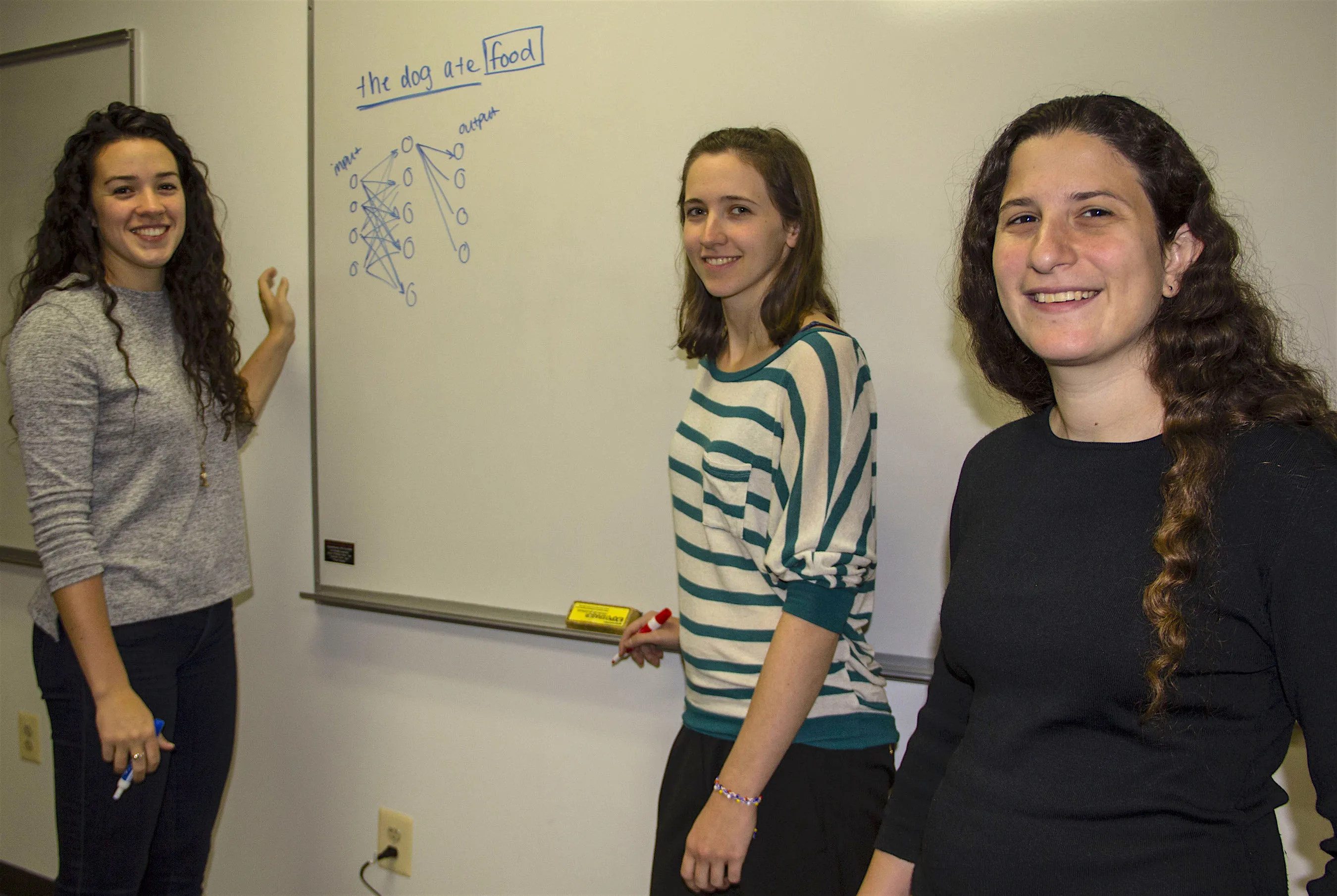
Naomi Feldman (right in photo), an assistant professor of linguistics with an appointment in UMIACS, is serving as research mentor to two students in a program designed to give them hands-on research experience in preparation for graduate degrees in linguistics or a related field.
Jackie Nelligan (left in photo) and Michaela Socolof (center) are the newest recipients of the Baggett Fellowship. The fellowship, established by 1992 linguistics graduate and software executive David Baggett, offers substantial support for individuals with a bachelor of arts or bachelor of science degree that are interested in gaining significant research experience before pursuing graduate study in linguistics or cognitive science.
Nelligan and Socolof are currently working on projects in the Computational Linguistics and Information Processing (CLIP) Laboratory, where Feldman is an active member.
Socolof, who received a bachelor of arts in linguistics with a minor in Italian from McGill University, is involved in a project focused on computational linguistics and theoretical syntax.
Socolof and Feldman are using computational models to get a better idea of the perceptual dimensions that humans use to perceive sounds in their language. They are adopting tools from speech technology to analyze large speech corpora—an approach often used in engineering settings but seldom applied to questions in human speech perception.
“The Baggett Fellowship allows me to devote considerable time to conducting research in my areas of interest and gives me opportunities that will hopefully help me navigate the world of grad school,” Socolof says. “For instance, I recently attended a computational phonology conference at UMass Amherst. I'm hoping that the Baggett program will give me a feel for what it's like to be immersed in research and will help me decide which area of linguistics I want to pursue in a Ph.D. program.”
Nelligan, who received a bachelor of arts in philosophy-psychology-neuroscience and mathematics with a minor in linguistics from Washington University in St. Louis, is working with Feldman and Philip Resnik, a professor of linguistics with an appointment in UMIACS, on mathematical modeling of machine teaching within the framework of vector space models.
The models Nelligan is developing will be used to explore how speeches or newspaper articles are optimized to convey a particular message, given the current beliefs of the audience. This is relevant for understanding political discourse, where candidates frame issues in ways they think will convince particular audiences to adopt their views.
“Coming from a school with a very small linguistics program, I wasn't sure what kind of work I wanted to go into after graduation—whether I truly wanted to go to graduate school, and in what field I wanted to end up,” Nelligan says. “This fellowship has given me an opportunity to work with prominent faculty in both linguistics and computer science, as well as giving me insight into the research world that I couldn’t get before. This year will allow me to explore my interests so I can apply to graduate schools knowing what I want out of their programs.”
Nelligan adds that gaining research experience and making professional connections will help her strengthen future applications.
“As a Baggett Fellow, there is no pressure to publish papers or complete a dissertation, so it’s a really unique opportunity to explore what you’re interested in, whether through doing research, sitting in on classes, or reaching out to faculty and students to talk about their work,” she says.
Feldman says Nelligan and Socolof are talented researchers.
“The research they are conducting is very impressive because they are applying state-of-the-art tools from language technology to answer questions that are central in cognitive science and linguistics,” Feldman says. “It is rare for researchers to have expertise in both computational and cognitive approaches to language, but Michaela and Jackie have the perfect skill set for integrating these areas.”
—Story by Melissa Brachfeld